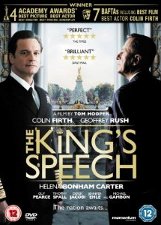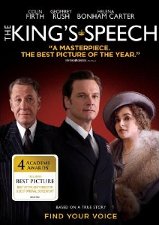The King's Speech
By M. Gowlett, guest author
Having just seen this much-anticipated, much-written-about and finally award-winning movie, I feel inspired to look a bit deeper and to write something about it.
This really is a rather special period drama in that the period is so recent and, of course, one of the star characters is still very much with us, her Royal Highness Queen Elizabeth II. Apparently, after seeing a private screening of the film, she said that she was ‘touched’ by Colin Firth's portrayal of her father, and gladly gave it her approval. I must say that I endorse her opinion — I am clearly in good company!
The storyline is very simple as the whole film is a build-up to the King's most famous address to his people on the 3rd of September 1939 at the outbreak of World War II. In it, he called for all the citizens of Britain and the Commonwealth to “stand calm, firm and united in the dark times ahead”. This rallying speech, lasting just 5 minutes and 44 seconds, epitomised his sense of duty to his people; he and his wife refused to be evacuated along with his young princess daughters, insisting instead on staying on in London throughout the war, sharing in the bombing raids and supporting his people. When Buckingham Palace itself was hit by a bomb, the Queen apparently commented cheerily that she was glad, as it made her feel that she could face her fellow London residents, especially those living in the East End of the city, who were suffering the worst of the air-raids — the Luftwaffe could easily follow the route of the River Thames which led them directly to the docks in east London, where the first bombs were dropped night after night during the strategic attack on Britain from September 1940 to May 1941. Many of these first bombs were incendiary bombs causing huge fires that acted as beacons for following bombers bringing their deadly loads of high explosives. They were dark and stressful times indeed!
George VI proved to be a very good king despite his initially being a very reluctant one. He was born in 1895, the second son of King George V and Queen Mary, and was known at home as Bertie, an abbreviation of his first name, Albert. He had a traumatic and rather unhappy childhood as he was not blessed with good health and lived in the shadow of his brother David, one year his senior. Bertie not only suffered stomach problems and weak legs, for which he was made to wear splints, but he was inflicted by a pronounced and debilitating stammer. This was made worse by criticism from his disciplinarian father and possibly also by being forced to write with his right hand though he was clearly left-handed. David, on the other hand was healthy, athletic, good-looking and popular with the girls, and quite likely on occasions to have made fun of his stammering younger brother. His mother, Queen Mary, was someone who was not able to express her feelings easily, so was probably not very close to Bertie, and not very helpful to him in this regard. His great stroke of good fortune came when he met Lady Elizabeth Bowes-Lyon in 1920, and they were married three years later in 1923. With her warm, out-going personality and great strength of character, the new Duchess of York gave him the love and understanding that he must have craved, won the hearts of the nation and was a tower of strength for Bertie, the Duke of York. You could say that she must have been a strong lady to not only have been a great, supportive Queen consort to King George VI, but also to have outlived him by half a century, living on as the much-loved Queen Elizabeth the Queen Mother until her ‘recent’ death in 2002, at the ripe old age of 102.
The trailer of the The King's Speech.
The next stroke of good luck for the Duke was his wife's discovery of the Australian speech therapist Lionel Logue. Bertie had been subjected to the treatment of an endless stream of highly qualified, expensive therapists over the years, none of whom had been able to help, and had no doubt only served to increase the poor young man's sense of frustration and failure. The film shows us one such pompous therapist filling the Duke's mouth with sterilised marbles — no wonder he spat them out angrily! On October the 31st 1925, the Duke had had to deliver the closing speech at the British Empire Exhibition in Wembley and he had failed miserably; a painful experience for both him and the audience, and it gave him new resolution to tackle his demons.
On first meeting Lionel Logue, the Duke was shocked at his familiar, seemingly disrespectful manner, such as insisting on calling him ‘Bertie’, a name only used by family. However, this was an intrinsic part of Logue's method of therapy which required the patient to do such undignified things as to shout over loud music and vigorously utter profanities, but which essentially incorporated humour, patience and sympathy — very different from the conventional methods of the day! Logue didn't claim to be as highly qualified as other therapists, but he had a wealth of experience teaching elocution, studying the art of public speaking and successfully helping Australian war veterans who had suffered shell-shock and been left with impaired speech.
The therapy sessions were not all plain sailing as Bertie quit a few times out of sheer frustration that he was still not getting anywhere; but gradually the two of them built up a wonderful trusting relationship and this certainly paid off in the end! (We know now that it actually led to a lifelong friendship, and Lionel Logue being made a Commander of the Royal Victorian Order, the only order of chivalry that specifically rewards acts of personal service to a Monarch.)
However, one of the hurdles that had to be surmounted was the King's coronation speech. Things had happened fast: in 1936, on the death of his father, King George V, the elder son, David, naturally succeeded to the throne as King Edward VIII (‘Edward’ being his first name) but within the year, he had abdicated, famously explaining that he found it impossible to carry the heavy burden of responsibility without the help and support of the woman he loved: Mrs. Wallis Warfield Simpson. She was an American, and by this time twice divorced, making it impossible for her to become Queen consort to the Head of the Church of England. David's younger brother the Duke of York, Bertie, terribly unprepared as he felt himself to be, became King George VI (‘George’ being the last of his four forenames) and was crowned on the 12th of May 1937, the day set for his brother's coronation. In the film, we witness rehearsal sessions where Logue gently but firmly coaxes the King to master the responses required of him during the ceremony.
When it came to the all-important speech, the address to the British people at the outbreak of war, the intensive private rehearsal sessions in which Logue put to use all of his skills, patience, and support are amazingly portrayed in the film, and must surely have been amazing in real life. During the final performance on the day, we experience all of the tension and emotion, as if it were a loved member of our own family who is being put to the test. Colin Firth's good-looking face is not only able to express a wealth of emotions, but also to communicate the vulnerability and struggle going on inside — his previous roles as a grieving professor in ‘A Single Man’ and as Johannes Vermeer in ‘Girl with a Pearl Earring’ bear witness to this.
The actual speech made by King George VI on September 3rd, 1939.
To my mind, the 2011 film ‘The King's Speech’ deservedly won its four Oscars: for best film, best original screenplay, best director in Tom Hooper, and best actor in Colin Firth. In addition, Helena Bonham Carter gave a great performance as Elizabeth, Duchess and Queen (very different from her role in recent Harry Potter films) the veteran British film stars, Michael Gambon, Claire Bloom and Derek Jacobi added extra substance and of course, Geoffrey Rush as Lionel Logue was just brilliant!
I would conclude by saying that, despite the tears welling up inside me towards the end, for me this is a wonderful feel-good period drama through which we are privileged to glimpse into the life of a good and brave man. Poor health always restricted the extent to which he could serve his country in the traditional military sense; he served in the Royal Navy aboard the HMS Collingwood during WWI, and later qualified as a pilot in the newly-created Royal Air Force; but it is his personal bravery in overcoming his handicap and supporting his subjects so well which sets him apart. Above all, this film teaches us a lot about perseverance — not a bad lesson to learn!
2011-04-08
Back to the articles list or the main page.

